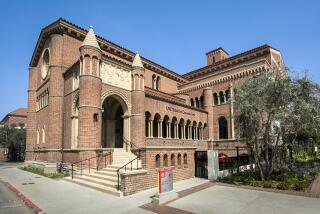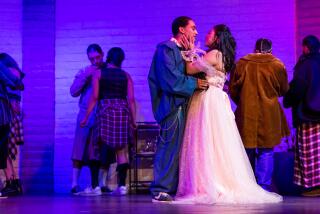SHAKESPEARE SERIES : CLASS HELPS THESPIANS HONE CRAFT
- Share via
Twelve acting students stand poised to strike. The command comes from the sidelines: “ En garde . Attack!” The fencing lesson begins, punctuated only by the sound of metal striking metal.
The cavernous auditorium is chilly, but beads of sweat dot foreheads as the students concentrate on their dueling partners. Down the hall, more young actors lie in a circle, running through a series of vocal and breathing exercises. The room fills with sighs and groans as students struggle to bend their bodies into yoga positions. “You sound like a leaky radiator,” ribs the instructor as he crouches to illustrate the correct technique.
What has lured these students out of warm beds on this cold Saturday morning is a workshop in Shakespearean acting, the third in a series of 16 all-day sessions now being offered by Rancho Santiago College at its Garden Grove campus.
The workshop leads students through an intensive exploration of the physical and mental demands on actors performing Shakespeare. The curriculum covers fencing, stage combat, clowning and vocal technique, as well as monologue and scene study, scansion (a method of searching for clues in the rhythm of verse to clarify the playwright’s intentions), and even some of the nuts and bolts of job hunting.
Students will also get a chance to apply what they’ve learned. Many will go on to the Grove Shakespeare Festival’s summer conservatory program, offered at the Grove Theatre in conjunction with Rancho Santiago College. Conservatory students will be cast in the production of “Love’s Labour’s Lost” (July 25-Aug. 16) and will provide preshow entertainment for all festival productions.
The workshop and summer conservatory are directed by Rancho Santiago drama instructors Phillip Beck and Jerry McGonigle. When they joined the community college faculty last September, only two students had signed up for the Shakespeare course. The two instructors rounded up only enough students to keep the class afloat, but since then, word of mouth has helped the recruiting process. Thirty-six students are enrolled in the spring workshop. Beck estimates that about 10% are beginning acting students; 25 to 30% have bachelor’s degrees in theater, and the rest are professionals with strong acting backgrounds who have never gotten around to doing Shakespeare.
Beck said most acting students seem to be intimidated by Shakespeare and put off studying the Bard for as long as possible. Some skip it altogether.
“A lot of the actors who are out there--and the vast majority of those 95% of the actors who are unemployed--are people who are trying to take shortcuts,” Beck said. “They really haven’t spent the time to work on the craft.”
Shakespeare can be intimidating. “It’s basically almost a foreign language,” said Stephen Grodt, a workshop student who lives in Irvine.
The way McGonigle sees it, there is a tangible link between the study of Shakespeare and contemporary drama. If students can master Shakespeare’s language and make real people out of his characters, they are that much further ahead in making sense out of contemporary texts, McGonigle said.
Beck and McGonigle trained at the American Conservatory Theatre in San Francisco, and they share a common approach based on their ACT training. They stress what McGonigle calls “positation”: creating a positive atmosphere that encourages students to take chances--to “dare to fail,” as Beck puts it.
“We also really stress and try to push people into thinking of themselves as artists and preparing to go out and do audition work,” Beck said. After four years of studying acting in college, many students leave with a diploma in hand and no idea of what to do next, he added. Beck and McGonigle, both Equity actors, offer the students concrete suggestions based on their own experiences.
The workshop has attracted students from throughout Los Angeles and Orange counties, including one student who commutes from North Hollywood to Garden Grove every Saturday. Many said they had collected bits and pieces of Shakespeare in college drama courses, but were attracted to the Rancho Santiago workshop because of its comprehensive scope and the chance to fill in some of the blanks in their own theater backgrounds. Three of the students are now in rehearsal for local Shakespeare productions.
April Adams, who commutes to the workshop from Inglewood, had seen other Shakespearean workshops advertised in trade publications, but at much higher tuitions than the $25-a-semester community college fee. “It’s sort of unbelievable for this price,” she said.
More to Read
The biggest entertainment stories
Get our big stories about Hollywood, film, television, music, arts, culture and more right in your inbox as soon as they publish.
You may occasionally receive promotional content from the Los Angeles Times.










